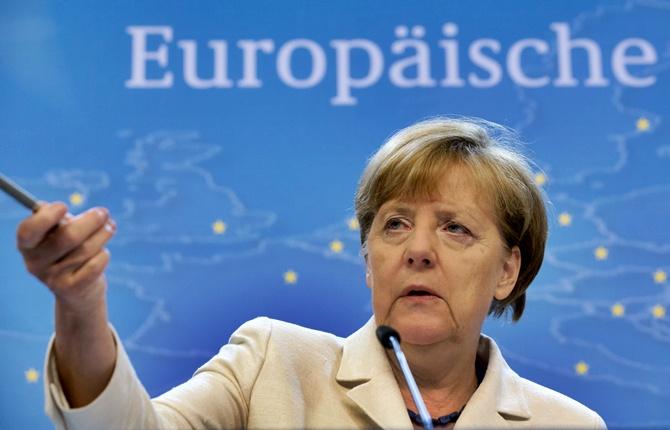"This agreement increases the already enormous liability risk of European taxpayers," CDU lawmaker Wolfgang Bosbach, who has opposed previous Greek bailouts said.

Germany's political establishment rushed to defend a deal with Greece on Monday to negotiate a third bailout, with Chancellor Angela Merkel's lieutenants selling the agreement as a victory for Europe that her conservatives can support.
The hard line taken in the negotiations with Greece by Merkel's finance minister, Wolfgang Schaeuble, has emboldened lawmakers in the ranks of her conservatives where many were sceptical about backing further aid to Athens.
German lawmakers will be recalled from their summer recess for a vote -- likely on Friday -- to authorise the opening of loan negotiations with Athens once the Greek parliament has approved the entire programme and passed the first laws.
Merkel's allies played up the deal, reached early on Monday after mammoth talks in Brussels.
"Europe has won," tweeted Peter Altmaier, Merkel's chief of staff, adding that Germany "was part of the solution -- from the beginning until the end!"
Peter Tauber, the general secretary of Merkel's Christian Democrats (CDU), said he expected the conservative group in Germany's parliament to support the chancellor's stance.
The CDU's federal executive board broadly backed Merkel's position on Greece, said Tauber, adding that he had only heard one person express what he would consider to be criticism during a meeting on Monday morning.
"It was clear in the federal executive board that the board is behind Angela Merkel on this issue and supports her. The applause went on for a long time after she had given a very energetic and enthusiastic presentation," he said. Some lawmakers remain deeply sceptical.
"This agreement increases the already enormous liability risk of European taxpayers," CDU lawmaker Wolfgang Bosbach, who has opposed previous Greek bailouts, told Focus Online.
An idea floated by Schaeuble's ministry for Greece to take a "time-out" from the euro zone gained traction with some conservatives at the weekend, though it has since been dropped.
In February, German lawmakers approved an extension of Greece's second bailout but a record number of conservative dissenters underscored the scepticism in Berlin about whether Athens can be trusted to deliver reforms.
Of 32 "no" votes, 29 came from Merkel's CDU and their sister party, the Bavarian Christian Social Union (CSU). Moreover, 109 conservatives signed statements saying they had voted for the extension but with reservations.
The Social Democrats (SPD), junior partner in Merkel's coalition, quickly supported the latest Greece deal.
Peter Matuschek of polling institute Forsa expected the German parliament to vote in favour of the agreement.
"Of course there will be the usual suspects in the conservative bloc who already voted against Greek bailouts in the past," he said.
"But all in all, Merkel's majority in the Bundestag is so huge that it will be enough."









